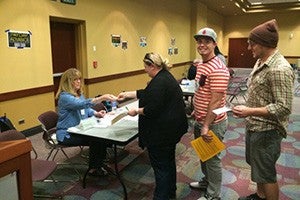
Kelley Connor, assistant professor for the School of Nursing, and Cathy Deckys, clinical assistant professor for the School of Nursing, conducted a poverty simulation through the Community Action Poverty Simulation (CAPS) kit with 74 students from their Health Science Studies (HLTHST) 400 interprofessional capstone course on Sept 26.
“CAPS enables participants to look at poverty from a variety of agencies and then to recognize and discuss the potential for change within their local communities,” said Elaine West, executive director of the Missouri Association for Community Action, which made the simulation available nationwide. The simulation was designed to sensitize those who frequently deal with low income families as well as to create a broader awareness of poverty among policymakers, community leaders, and others.
Using the simulation kit, students role-played the lives of low-income families. Some were Temporary Assistance for Needy Families recipients, some were disabled, and others were senior citizens on Social Security. They had the stressful task of providing for basic necessities and shelter on a limited budget during the course of four 15-minute “weeks.” They interacted with volunteers who played people in human service agencies, grocers, pawnbrokers, bill collectors, job interviewers, police officers, and others. Participants included staff members of various human service agencies and local civic and community leaders.
“This program helps people understand the complexities and frustrations of living in poverty day to day,” said Deckys. “With a greater awareness of its impact, we can more effectively address the poverty issues in our community.”
The HLTHST 400 course explored the impact of poverty on the HealthyPeople 2020 goals. HealthyPeople, part of the US Office of Disease Prevention and Health Promotion, provides science-based, 10-year national objectives for improving the health of all Americans. They strive to:
- identify nationwide health improvement priorities;
- increase public awareness and understanding of the determinants of health, disease, and disability and the opportunities for progress;
- provide measurable objectives and goals that are applicable at many levels;
- and identify critical research, evaluation, and data collection needs.